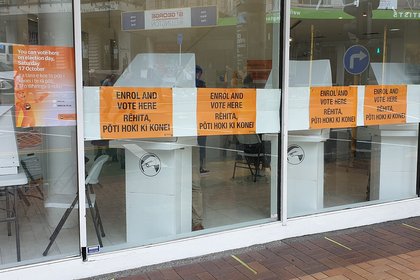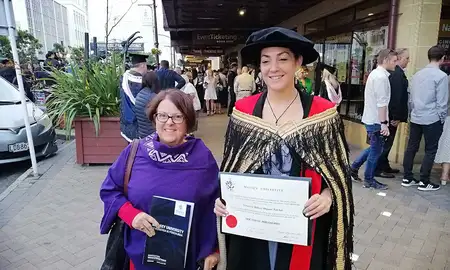
Advance voting booth in Wellington for the 2020 General Election. Photo credit: Kiwichris, CC BY-SA 4.0 via Wikimedia Commons
Complaints made by Māori voters during the 2017 General Election raised concerns about unfair treatment and institutional racism at polling booths, with the Electoral Commission assuring New Zealanders that problems underpinning these concerns would not be repeated in 2020.
However, research conducted by Associate Professor Veronica Tawhai, Ngāti Porou, Ngāti Uepohatu, from Te Kunenga ki Pūrehuroa Massey University showed several issues were ongoing in the 2020 Election. This included some polling places having no Māori Roll, no voting ballots for Māori electorates, and electors on the Māori roll experiencing discrimination and longer wait times.
“Given Māori electorates have existed since 1867, the lack of preparedness and attention given to ensuring those on the Māori Roll can exercise their democratic right to vote as easily and efficiently as other New Zealanders is unacceptable,” Dr Tawhai says.
"The poor treatment of some Māori by polling booth staff in past elections, due to their choice to be on the Māori Roll, must also be entirely eliminated. We are asking the Commission to confirm what steps they have taken to ensure this type of electoral injustice for Māori does not reoccur in 2023.”
Dr Tawhai’s research on Māori experiences during the 2020 General Election investigated the factors that contributed to Māori having either a positive or negative experience during that election, and what recommendations participants had for improving the voting experience for Māori in future.
Key recommendations included an increase in Māori venues as polling places, an increase in the number of Māori and te reo Māori (Māori language) speaking staff, the proper training of all staff with regard to the Māori Roll and Māori electorates, including pronunciation, and the vetting of staff for discriminatory attitudes.
The research survey, which was conducted online, had Māori electors from across Aotearoa New Zealand participate, indicating the issues and desire for change was widespread.
Co-researcher of the project John James Carberry, Ngāti Kahungunu ki Wairarapa, Ngāti Porou, explains the negative experiences had by Māori are unnecessary and disheartening.
“Māori should never be made to feel a ‘nuisance’ or embarrassed because of the lack of regard being given to our electoral rights as Māori. Given its awareness of these issues over the last two elections, it is sincerely hoped the Electoral Commission has addressed these as a reflection of their commitment to ensuring equality for all electors in 2023, including Māori.”
Dr Tawhai and Mr Carberry will be running the survey again to gauge Māori voters’ experiences for this year’s General Election, starting at the commencement of the advanced voting period on 2 October.
For a copy of the research report please contact:
Dr Veronica MH Tawhai V.M.Tawhai@massey.ac.nz
John James M Carberry johnjames.carberry@gmail.com
Related news
Associate Professor Veronica Tawhai appointed to new role of Pūkenga Tiriti
Associate Professor Veronica Tawhai, Ngati Porou; Ngati Uepohatu, has been appointed to the newly established role of Pūkenga Tiriti and joins the Office of the DVC Māori from Te Pūtahi-a-Toi after 14 years lecturing in Māori policy and politics.
